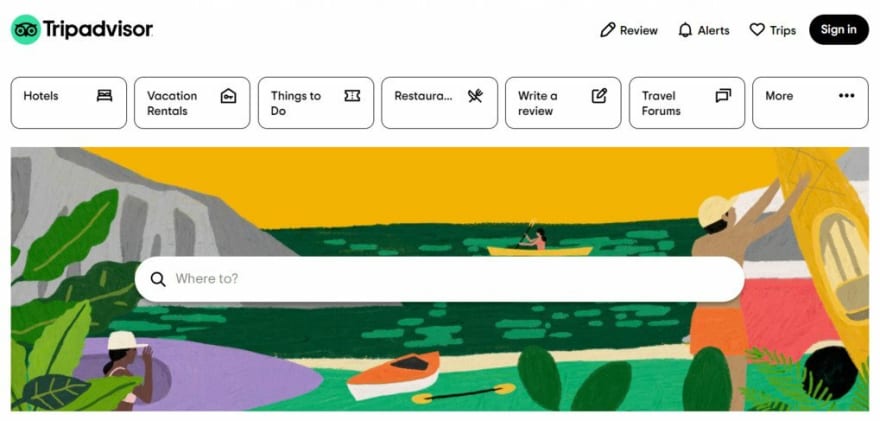The article was initially published on Codica Blog.
Business directory websites like Google My Business, TripAdvisor, or Facebook became a magic bullet for many companies. By listing their business on such platforms, they get exposure and find new customers.
The first business directory website that comes to our mind is Yelp. Indeed, this platform can boast 178 million unique visitors per month.
So how did Yelp achieve such success? And what should you consider if you want to launch a similar platform? To get answers check the guide below prepared by our expert team.
Business directory website: definition and key players
According to Wikipedia, business directory websites are platforms where businesses are listed within niche-based categories. Companies can be classified based on location, size, or activity.
Usually, such platforms have a separate section where users leave their comments, reviews, and feedback. It is an essential part of any listing website and it is not for nothing. The thing is that 87% of customers prefer reading online reviews for local businesses.
The recent data provided by BrightLocal shows that today business directory websites are highly sought-after since more and more users look for local companies on the Internet.
Leading business directory websites and review platforms:
- Google My Business;
- Bing Places for Business;
- Facebook;
- TripAdvisor;
- FoursQuare.
Building a website like Yelp: a step-by-step guide
Step1. Find your niche
For a start, define what consumer category you want to target. You may follow the lead of Yelp and choose an all-in-one approach.
However, in recent years, focusing on a particular niche has become a more sensible option.
This way, you will make your offerings more unique.
For example, TripAdvisor is the biggest and most popular travel guidance platform.
Step 2. Choose the right business model
Let’s discuss the most common revenue models you should put on notice.
- Advertisement - it is the primary monetization strategy for Yelp. Sponsored ads bring the platform 90% of revenue.
- Profile upgrades. This revenue model is widely used by marketplace software platforms. Users get extra functionality for additional payment. For example, you may allow businesses to hide their competitor’s ad from the page.
- Paid analytical tools. With their help, companies will be able to track their performance in real-time mode.
- Commissions. Yelp benefits from this revenue model by taking a commission of 30% for deals and 10% for gift certificates.
- Subscription. By purchasing a monthly subscription fee, users get access to the extra functionality of your platform.
Step 3. Define the required functionality and launch an MVP first
Before getting wrapped up in building a review website like Yelp, consider creating a minimum viable product. With this approach, you get better chances to create a successful and profitable product.
Here is why:
- You release the platform faster. You pick one or two basic features and ask the developers to build them. When the solution is completed, you may show it to the target audience.
- You increase your chances to get the required funding by showing initial interest in your product.
- You may start testing marketing strategies and sales channels much earlier.
When building an MVP of your business directory website, we recommend that you start with the following features:
- Registration and account verification;
- Advanced search and filters;
- Rating and review system;
- Company profile with business description.
- Moderation.
Step 4. Decide which functionality should be added in later iterations
As soon as you launched your MVP and got favorable feedback from pioneer users, consider adding new features. This way, you will improve the user experience and gain loyal customers.
Below you can see the list of features you may find useful for your fully-fledged business directory website:
- Maps;
- Personalization;
- Communication channels;
- Reservation;
- AI and machine learning.
Business directory website development: the price tag
Here we should mention two factors that have a direct impact on the cost of business directory website development.
- The development approach: off-the-shelf solutions vs. bespoke software.
- Functionality you want to implement.
Today you can find many solutions that will help you launch your review website in the quickest time possible. Those products are noted for their cost-effectiveness and third-party services integration.
Custom web software development, in its turn, is a more expensive option. However, it has undeniable benefits that will allow you to save costs in the long run. These are enhanced data protection, no hidden costs or license fees.
Also, you will get the functionality tailored to your particular business needs.
So let’s see a set of features for a website like Yelp and what would be pricing for developing them.
- UX/UI Development;
- Authorization and Security;
- User Accounts;
- Home page;
- Search and filters;
- Business page;
- Reviews & Ratings;
- Maps;
- Payments;
- Messenger;
- Group Chat;
- Analytical dashboard;
- Ad posting form;
- Highlights;
- Notifications;
- User Panel;
- Admin panel.
If we take the average rate set by Eastern European developers, which is $45/hour, the price of developing a business directory website like Yelp starts with $44,460.
This is the approximate sum of money you will need if you decide to partner with a company located, for example, in Ukraine. Please note that only your development provider will be able to provide you with the final quote.





Top comments (0)
Some comments may only be visible to logged-in visitors. Sign in to view all comments.